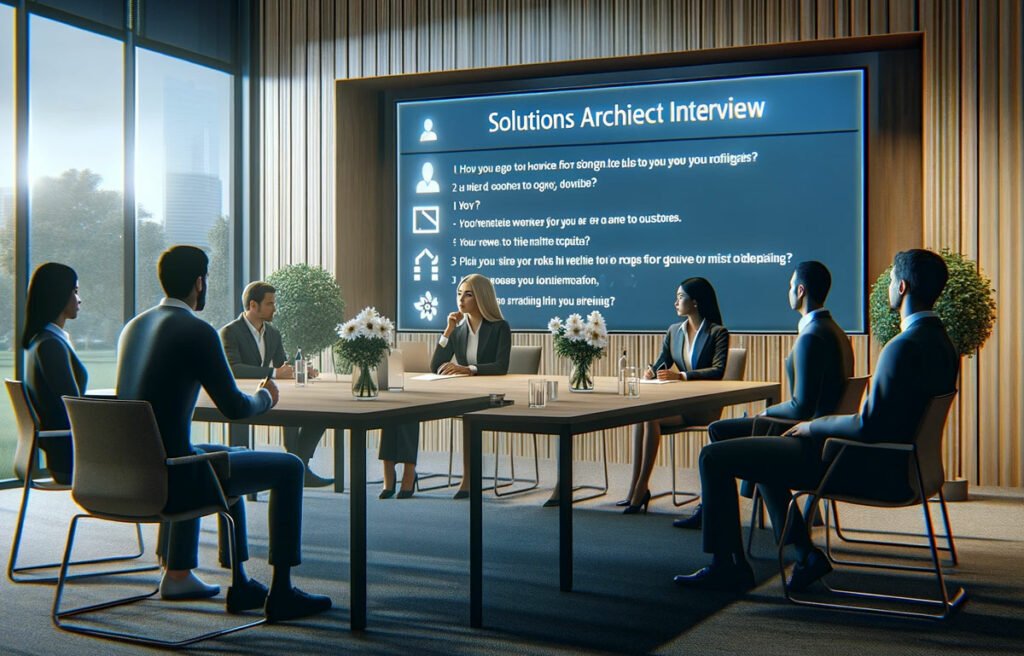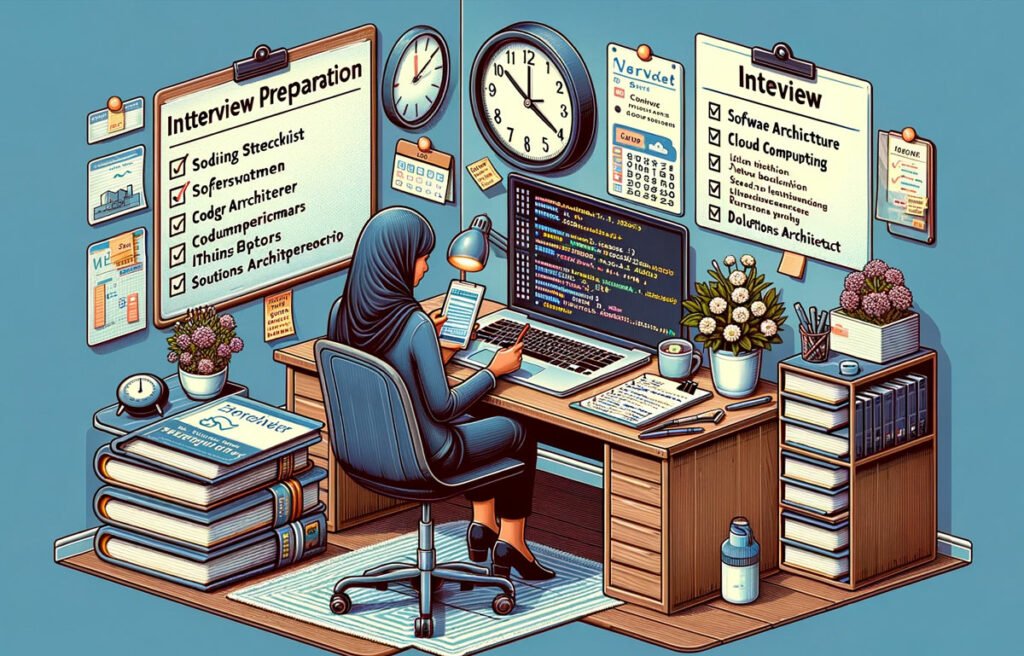Introduction to the Role of a Solutions Architect

Solutions Architects play a pivotal role in the technological landscape of a company. As a Solutions Architect, your primary responsibility is to design and implement software solutions that align with the company’s goals and requirements. This role demands a unique blend of technical proficiency, strategic thinking, and effective communication skills.
A Solutions Architect is akin to a bridge between complex technical problems and practical solutions. They work closely with stakeholders and technical teams to ensure that the proposed solutions not only meet current needs but also anticipate future challenges and technological advancements. Their role often involves:
- Understanding Business Requirements: They must deeply understand the business needs and translate them into technical specifications.
- Designing Systems and Architectures: Creating scalable and efficient system architectures that integrate well with existing systems.
- Leading Implementation: Overseeing the development and implementation of the designed solutions.
- Collaborating with Various Teams: Working closely with development teams, project managers, and other stakeholders.
- Staying Updated with Technologies: Keeping abreast of the latest technological trends and incorporating them into solutions.
As a Solutions Architect, you are expected to have a robust technical background, often in software development. Expertise in specific fields, such as cloud services (e.g., AWS, Azure), data management, or cybersecurity, is highly valuable. Soft skills like problem-solving, leadership, and communication are equally important, as they enable you to convey complex technical ideas to non-technical stakeholders effectively.
The role is dynamic, requiring continuous learning and adaptation. It’s a role that not only shapes the technological backbone of an organization but also drives its strategic direction through technology.
Contents
- Common Interview Formats
- Core Interview Questions
- Technical Knowledge and Skills
- Preparing for Behavioral Questions
- Case Studies and Problem-Solving
- Interview Preparation Checklist
- Resources and Further Reading
- Networking and Community
Common Questions
Common Interview Formats

When preparing for a Solutions Architect interview, it’s essential to be aware of the different interview formats you might encounter. Each format aims to evaluate various aspects of your skills and suitability for the role. Here’s an overview of common formats:
1. Technical Interviews:
- Focus: These assess your technical knowledge and problem-solving skills.
- Format: You might be asked to solve real-world problems, explain your approach to designing a system, or answer technical questions.
- Preparation: Revise key technical concepts, study design patterns, and practice explaining your thought process clearly.
2. Behavioral Interviews:
- Focus: Aimed at understanding how you’ve handled situations in the past.
- Format: Questions are often framed as “Tell me about a time when…”.
- Preparation: Reflect on past work experiences, focusing on challenges, successes, teamwork, and problem-solving.
3. Case Study or Whiteboard Interviews:
- Focus: Evaluate your approach to solving complex, often hypothetical, business problems.
- Format: You may be presented with a case study to discuss or asked to design a system on a whiteboard.
- Preparation: Practice structuring your answers methodically, and focus on articulating your reasoning and decision-making process.
4. Panel Interviews:
- Focus: Often used to assess how you interact with multiple team members and handle diverse perspectives.
- Format: You’ll be interviewed by several people at once, possibly from different departments.
- Preparation: Be ready to address a variety of questions and engage with multiple interviewers simultaneously.
5. Cultural Fit Interviews:
- Focus: These interviews assess whether your values and working style align with the company’s culture.
- Format: Questions often revolve around your work ethic, collaboration style, and adaptability.
- Preparation: Research the company’s values and culture; be prepared to share experiences that highlight your compatibility.
6. Practical or Hands-On Interviews:
- Focus: Test your practical skills in a real or simulated work environment.
- Format: You might be asked to complete a task or solve a problem within a set time.
- Preparation: Brush up on your practical skills relevant to the role; practice under time constraints.
In each format, it’s crucial to demonstrate not only your technical expertise but also soft skills like communication, leadership, and adaptability. Preparing for a variety of formats ensures you’re ready for any type of question or scenario that comes your way.
Core Interview Questions

In a Solutions Architect interview, certain core questions are frequently asked to assess your technical and strategic capabilities. Being well-prepared for these questions can significantly enhance your chances of success. Below are some of the core interview questions along with key points you should consider in your responses:
1. How do you approach designing a new system?
- Key Points: Discuss your methodology, including requirement analysis, choosing the right technology stack, and considering scalability and security.
Why does this question get asked: This question is often asked in interviews for a Software Solutions Architect role to gauge the candidate’s methodology in system design and their ability to align technical solutions with business objectives. It helps the interviewer understand the candidate’s problem-solving skills, technical knowledge, and their approach to handling project complexities and stakeholder expectations.
Quick Answer: When designing a new system, my approach is holistic and iterative, focusing on understanding the business goals and user needs first. I start by engaging with stakeholders to gather requirements and define clear objectives. This is followed by creating a high-level design, considering scalability, security, and maintainability. I prioritize modular and flexible architecture to accommodate future changes. Then, I select appropriate technologies and frameworks, ensuring they align with the project’s needs and the team’s expertise. Throughout the process, I advocate for best practices in software development and continuous integration/continuous deployment (CI/CD) to streamline development and deployment. Regular reviews and adjustments are made as the project evolves, ensuring alignment with the initial goals and adapting to any new requirements or challenges that arise.
Click here for a more detailed answer to this question.
2. Can you describe a challenging project you worked on and how you handled it?
- Key Points: Focus on a specific project, outline the challenges, your role, the solutions you implemented, and the outcomes.
3. How do you ensure your designs meet both technical and business requirements?
- Key Points: Talk about collaboration with stakeholders, understanding business goals, and aligning technical solutions with these goals.
4. What are the most important considerations when integrating new technology into an existing system?
- Key Points: Address compatibility, data migration, user training, and minimising disruption to existing operations.
5. How do you stay updated with current technological trends?
- Key Points: Mention specific resources (like journals, websites, conferences) and how continuous learning impacts your work.
6. Explain a time when you had to make a trade-off between functionality and security.
- Key Points: Provide an example, the reasoning behind your decision, and how you maintained an acceptable security level.
7. What strategies do you use to communicate technical plans to non-technical team members?
- Key Points: Highlight your communication skills, use of visual aids, simplifying complex concepts, and ensuring understanding.
8. How do you handle disagreements with stakeholders about architectural decisions?
- Key Points: Discuss your approach to conflict resolution, negotiation skills, and balancing different viewpoints.
9. Describe your experience with cloud-based architectures.
- Key Points: If applicable, detail your work with specific platforms (like AWS, Azure, etc.), the architectures you’ve designed, and the benefits and challenges you’ve encountered.
10. How do you ensure your architecture is scalable and maintainable?
- Key Points: Talk about designing for growth, using modular components, documentation, and considering long-term maintenance.
Preparing for these questions involves not just knowing the technical aspects but also being able to articulate your experiences and thought processes clearly. Practice your responses, focusing on clarity, brevity, and relevance to the question.
Technical Knowledge and Skills

The role of a Solutions Architect requires a diverse set of technical knowledge and skills. Here, we outline the key areas you should be proficient in to excel in this role:
1. System Design and Architecture:
- Understand various architectural styles (like microservices, monoliths) and patterns.
- Knowledge of designing scalable and resilient systems.
2. Cloud Computing:
- Familiarity with cloud service providers like AWS, Azure, and Google Cloud.
- Skills in cloud architecture, deployment models, and cost optimisation.
3. Networking and Security:
- Understanding of network protocols, VPNs, and firewalls.
- Knowledge of security practices, compliance standards, and risk management.
4. Data Management and Storage:
- Skills in database design, both SQL and NoSQL.
- Knowledge of data warehousing, ETL processes, and big data technologies.
5. DevOps Practices:
- Familiarity with CI/CD pipelines, automation tools, and containerisation (like Docker, Kubernetes).
- Understanding of Infrastructure as Code (IaC) principles.
6. Programming and Scripting:
- Proficiency in at least one programming language (e.g., Java, Python, .NET).
- Ability to write scripts to automate tasks and processes.
7. Software Development Lifecycle (SDLC):
- Knowledge of various development methodologies (like Agile, Scrum, Waterfall).
- Experience with version control systems (e.g., Git).
8. Performance Tuning and Monitoring:
- Skills in system monitoring, performance tuning, and troubleshooting.
- Use of monitoring tools and analytics to maintain system health.
9. Interpersonal and Soft Skills:
- Strong problem-solving abilities and analytical thinking.
- Excellent communication skills to articulate technical concepts to non-technical stakeholders.
Continuous learning is essential in this ever-evolving field. Keeping up-to-date with the latest technologies and trends will ensure you remain a valuable asset in any Solutions Architect role.
Preparing for Behavioral Questions

Behavioral questions are a crucial part of Solutions Architect interviews, aiming to assess your soft skills, problem-solving abilities, and how you handle workplace situations. Here’s how you can prepare:
Understand the STAR Method:
- Situation: Describe the context within which you performed a task or faced a challenge at work.
- Task: Explain the actual task or challenge that was involved.
- Action: Detail the specific actions you took to address the task or challenge.
- Result: Share the outcomes of your actions, emphasizing positive results and learnings.
Key Areas to Focus On:
- Teamwork and Collaboration: Prepare examples of how you have effectively worked in a team, resolved conflicts, or contributed to team success.
- Problem-Solving and Decision-Making: Think of instances where you faced a difficult problem or decision and how you approached it.
- Adaptability and Flexibility: Recall situations where you had to adapt to changes or overcome unexpected challenges.
- Leadership and Influence: Reflect on moments where you led a project or influenced others, even if you weren’t in a formal leadership role.
- Client or Stakeholder Management: Consider experiences dealing with clients or stakeholders, particularly where you navigated difficult situations or negotiations.
Tips for Responding:
- Be Specific: Provide concrete examples rather than general statements.
- Focus on Your Role: Clearly articulate your specific contributions and decisions.
- Balance Positivity with Honesty: It’s okay to discuss failures or challenges as long as you focus on what you learned and how you improved.
- Practice: Rehearse your responses but keep them natural and conversational.
Remember, behavioral questions are an opportunity to showcase your soft skills and how they complement your technical abilities. They give insight into your working style, how you fit into a team, and how you handle real-world situations.
Case Studies and Problem-Solving

In Solutions Architect interviews, case studies and problem-solving exercises are often used to evaluate your analytical skills, technical knowledge, and approach to real-world challenges. Preparing for these can give you a significant edge:
Understanding Case Studies:
- Real-World Scenarios: Case studies usually present real-world business problems, requiring you to demonstrate how you would apply your skills and knowledge.
- Comprehensive Analysis: They test your ability to analyze information, identify key issues, and develop effective solutions.
- Communication: Your ability to clearly articulate your thought process and solutions is as important as the solution itself.
Preparing for Problem-Solving Exercises:
- Technical Proficiency: Brush up on your technical skills relevant to the role, such as system design, cloud computing, and data management.
- Structured Approach: Practice a methodical approach to problem-solving. Break down the problem, analyze different components, and develop a solution step-by-step.
- Creativity and Innovation: Be prepared to think outside the box and propose innovative solutions.
Tips for Tackling Case Studies and Exercises:
- Understand the Problem: Take time to fully understand the problem before jumping to solutions.
- Ask Clarifying Questions: Don’t hesitate to ask questions if you need more information or clarification.
- Think Aloud: Explain your thought process as you work through the problem. This helps interviewers understand how you think.
- Focus on the Big Picture: While details are important, also consider the broader business context of the problem.
- Review Past Case Studies: Familiarize yourself with common types of case studies in your field to get a sense of what to expect.
Case studies and problem-solving exercises are an opportunity to showcase how you can apply your skills in a practical context. They not only test your technical abilities but also your critical thinking, creativity, and communication skills.
Interview Preparation Checklist

Preparing thoroughly for a Solutions Architect interview can significantly increase your chances of success. Here’s a comprehensive checklist to guide your preparation:
Technical Preparation:
- Review Key Concepts: Brush up on essential technical topics relevant to the role.
- Practice Coding: If coding is part of the interview, practice relevant problems.
- Understand System Design: Review principles of system design and architecture.
Behavioral Preparation:
- Prepare for Behavioral Questions: Use the STAR method to prepare examples.
- Understand the Company Culture: Research the company to tailor your responses to their culture and values.
Case Studies and Problem-Solving:
- Study Past Case Studies: Familiarize yourself with typical case study formats.
- Practice Problem-Solving: Work through relevant exercises and scenarios.
Mock Interviews:
- Conduct Mock Interviews: Practice with a friend or use online platforms.
- Get Feedback: Use the feedback to improve your answers and presentation.
Research the Company:
- Understand the Company’s Products and Services: Know what the company does and any recent news or developments.
- Know the Interviewers: If possible, research the interviewers to understand their backgrounds and roles.
Logistics:
- Prepare Your Interview Space: Ensure a quiet, well-lit space for online interviews.
- Check Your Tech: Test your computer, webcam, and internet connection.
- Plan Your Route: If the interview is in-person, know how you’ll get there and how long it will take.
The Day Before:
- Review Your Notes: Go over your preparation one last time.
- Relax and Rest: Get a good night’s sleep to be fresh for the interview.
On the Day:
- Dress Appropriately: Choose professional attire suitable for the company culture.
- Be Punctual: Aim to be early, whether it’s logging in online or arriving at a location.
- Bring Necessary Documents: Have copies of your resume, portfolio, and any other required documents.
Remember, preparation is key to confidence. The more thoroughly you prepare, the more relaxed and confident you will be in the interview.
Resources and Further Reading

To excel as a Solutions Architect and ace your interviews, continuous learning is vital. Here’s a curated list of resources and further reading materials to deepen your knowledge and keep you updated:
Books:
- “Designing Data-Intensive Applications” by Martin Kleppmann: A comprehensive guide to the principles and practicalities of data systems design.
- “Clean Architecture: A Craftsman’s Guide to Software Structure and Design” by Robert C. Martin: Offers insights into software architecture and design principles.
- “The Phoenix Project: A Novel About IT, DevOps, and Helping Your Business Win” by Gene Kim, Kevin Behr, and George Spafford: A novel that brings insights into IT management and DevOps.
Online Courses:
- Coursera: Offers courses on cloud computing, system design, and various programming languages.
- Udemy: Features a range of courses specific to Solutions Architect roles, including AWS and Azure certifications.
- LinkedIn Learning: Provides courses on both technical and soft skills relevant for Solutions Architects.
Websites and Blogs:
- AWS Architecture Blog: Offers insights into cloud architecture best practices.
- Martin Fowler’s Blog: A great resource for software architecture and design patterns.
- Stack Overflow: Useful for keeping up with common issues and solutions in the tech community.
Podcasts and Webinars:
- Software Engineering Daily: Covers a wide range of topics in software engineering and architecture.
- The Cloudcast: Focuses on cloud computing and its applications in various industries.
- Tech Conferences: Attend webinars and virtual conferences like AWS re:Invent, Microsoft Ignite, and Google Cloud Next.
Networking and Community:
- LinkedIn Groups: Join groups for Solutions Architects to network and share knowledge.
- Meetup: Attend local meetups and workshops for hands-on experience and networking.
These resources will not only help you prepare for interviews but also assist in your overall career development as a Solutions Architect. Staying updated with the latest trends and continually honing your skills is key in this dynamic field.
